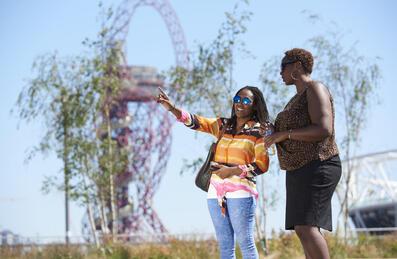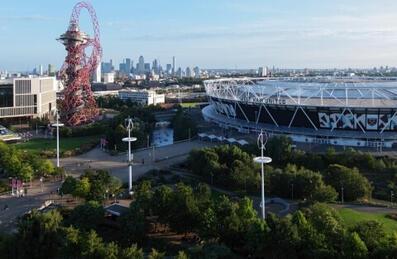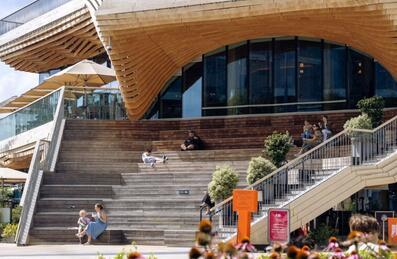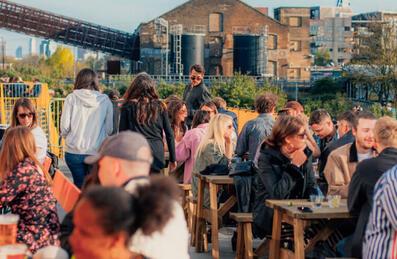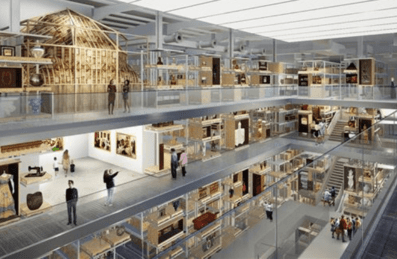
Popular Searches:
Keep up to date
Sign up today for exclusive offers and incredible experiences you won’t want to miss at Queen Elizabeth Olympic Park.
Sign up nowCreating opportunities for east Londoners
Creating opportunities for east Londoners
Story 14/06/2024
Michelle May, Director of Inclusive Economy, writes about the opportunities created by the 2012 legacy:
In little over twenty years, this area of east London has changed beyond recognition. What was once contaminated, industrial land has been transformed into a thriving metropolitan centre that global businesses and world-renowned cultural and academic institutions now call home.
While this is hugely exciting for Stratford, history tells us that – without careful attention – regeneration projects can too often create isolated places where local people feel shut off from the opportunities being created.
A key element of London’s 2005 Olympic bid was to ensure this would not be the case. The Games were to bring jobs, new homes, investment, and educational and cultural opportunities that would positively impact the lives of east Londoners for generations to come.
Since 2012, LLDC has built a strong track record of supporting people into employment, with over 16,000 jobs created through the construction programme, and local residents making up approximately 70 per cent of Queen Elizabeth Olympic Park’s workforce, looking after our iconic venues and Parklands.
But just as important as delivering jobs is creating the pathways to them.
Over the last 12 years we’ve worked in close partnership with a host of local and Park partners to create around 600 apprenticeships and various tailor-made programmes that upskill local young people and allow them to compete for the jobs of today and tomorrow.
Indeed, the successes achieved to date aren’t ours alone, but have been the work of many hands – the Growth Boroughs, and partners such as Badu, Social Ark, Hackney Quest and the Hackney Wick & Fish Island Community Development Trust who continue to deliver for local communities.
By the mid-2030s, over 40,000 jobs will have been delivered on the Park, in innovative business clusters at Here East and Stratford Cross and at East Bank, where V&A East, Sadler’s Wells East, UAL’s London College of Fashion, UCL East and BBC Music studios will form the UK’s newest cultural and education district.
These global organisations offer a sustainable pipeline of opportunities for local people, but it is a reciprocal relationship. With its diverse and creative talent pool and spirit of entrepreneurship, east London has so much to offer in return.
Our job at LLDC is to connect the two, facilitating a mutually beneficial relationship that can stand the test of time. We think that the opportunities created through these Park partnerships are life-changing for individuals and game-changing for organisations. Our ambition is to take these opportunities to scale.
Flagship facilities like the Good Growth Hub - a creative careers hub offering access to employment opportunities in the creative, cultural and technology sectors - and the construction and green skills centre at Build East create a stepping stone to the high-quality jobs being created here. These assets offer physical spaces where local talent is nurtured and learners are equipped with the knowledge, skills and confidence required for long-term, sustainable employment.
And by acknowledging the diversity issues that construction and creative sectors face, we have used our Park assets to facilitate dialogue, challenge the status quo and action initiatives that help ensure the future workforce of the Park is reflective of the communities it serves. One highlight of this work is the suite of resources we developed with Places for London and Serious About Youth (SAY) which help construction workers to challenge and change discriminatory behaviours and cultures so that our sites become more welcoming to people traditionally underrepresented in the sector.
We’ve been at the forefront of work to drive inclusive employment practices and workplace cultures, embedding London Living Wage (LLW) and fair employment standards across the Park. All Park employers pay LLW, including London Stadium which was the first major sports venue in the UK to be an accredited LLW building – vital when it supports so many jobs in the events, hospitality and catering sector.
Another key element of our work is engaging with local young people, not just as participants in our programmes and developments but as co-designers of them. For example, over 500 people have been involved in Elevate, our pioneering youth engagement programme that provides a platform and voice for participants, allowing young people to feed into plans for the Park and shape their future.
And through our East Ed programme, over 100 local schools are regularly engaged in a programme of activity that creates learning opportunities and seeks to positively influence career decisions at an early age.
Since their inception, East Summer School and East Careers Week have engaged with more than 4,500 school children and young people through free interactive workshops and courses in areas as wide-ranging as coding and fashion, to filmmaking and engineering.
It is initiatives such as these which have been crucial in building a successful legacy to date and will help inspire the next generation to build a career on the Park.
While much has already been achieved in ensuring regeneration brings real and tangible benefit to local communities, the job is far from finished. In collaboration our Growth Borough partners, we must continue to deepen our reach and ensure that future investment in the area goes hand in hand with fairness and equality; ensuring the Park plays its part in delivering a more inclusive economy so that the legacy of 2012 is felt by all.
This is increasingly challenging in our changing world, where global issues such as climate change and health emergencies have a very real impact on a local level and disproportionately impact some communities – including those in east London.
That is where SHIFT comes in. London’s new inclusive innovation district, SHIFT brings together business, academia, government and local communities to find and scale solutions to such challenges, using the Park as a living testbed for new ideas. Together, partners are working to further improve livelihoods in east London and set the standard for sustainable cities worldwide.
Through this family of Inclusive Economy assets at Queen Elizabeth Olympic Park we can continue to play our part in delivering a fairer, more inclusive economy for all.


